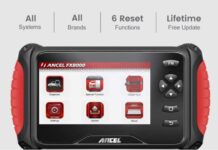While it might seem as if we’re constantly under the eye of surveillance cameras, there are times when they can be incredibly helpful. One of those situations is when you have been in a car accident and where it wasn’t your fault.
Providing evidence that attributes fault can be tricky, but if you have dashcam footage of the accident, then this can be the perfect way to show that you were not responsible.
But, even if you don’t have your own video footage, you might be able to get the footage you need via a CCTV camera. The next challenge, of course, is getting hold of the footage to be able to prove your innocence. In this guide, we’re going to provide you with our top tips for getting hold of that vital evidence.
How long are CCTV recordings available for?
Few organizations keep CCTV recordings indefinitely, so that means that you need to act promptly if a council or store has the recording you need.
While the recommendation from the police is to retain CCTV recordings for 31 days, that’s not a legal requirement. Local councils might be able to help for this period, but shops might reuse storage on their cameras every 24 hours. Don’t forget that even if the 31 day period is in place, you need to consider how long it takes for the application to be reviewed and actioned.
Do I Have the Right to Get Access to the CCTV Recording?
In the UK, the process of gaining access to the CCTV recording is through making a written Subject Access Request (SAR) to the owner of the camera.
It might be obvious who the camera owner is, but if not, there should be a sign close by to tell who it belongs to. You will also need to provide a copy of your ID to prove that you are the person that you’re requesting the footage of. You should also give the date and time of the accident so that the CCTV owner can find the recording more easily.
The owner of the CCTV may charge you a maximum of £10 to provide the footage for you.
Can I get access to traffic camera recordings?
It might be possible for you to get access to traffic cameras’ recordings, which is done by getting in touch with the local council or Highways England.
Do remember to start the request process as quickly as possible, as the footage will be wiped after thirty days.
Other details you should record after a car accident
Even if you have CCTV footage of the accident, it’s still essential that you get as much information as possible at the scene. This is because the footage might not show everything, and it will provide vital evidence to back up your case. This includes:
- The registration numbers of all of the vehicles involved in the accident
- The make, model, and colour of each vehicle
- The names and contact details of all drivers and passengers involved in the accident
- The name and contact details of any witnesses to the accident
- Photographs of damage to all vehicles involved
- A diagram or sketch of how the accident happened
- Contact details of any witnesses to the accident
Do be careful what you say after an accident
This is because it could be used against you. For example, if you admit that the accident was your fault, this will invalidate any insurance claim you make. It’s best to simply exchange names and contact details and leave any discussion of fault to be established by the insurance company.
You should also not make any comment as to the degree of any injuries. Stating that you’re okay could mean that a future claim for injuries is difficult to submit. Remember that some issues only become apparent days after the accident and that only a doctor can make an accurate diagnosis.
Remember – The Other Driver Might Not be Insured!
It’s thought that around one million UK motorists are driving without insurance, which means that even if you aren’t at fault for the accident, you might not be able to claim.
The best way to protect yourself against this is to take out Uninsured Driver Cover as part of your motor insurance policy. This will cover the cost of repairs to your vehicle and any medical treatment that you need as a result of an accident caused by an uninsured driver.
If you have been involved in a car accident that wasn’t your fault, then we hope that this guide has been useful in helping you understand how to get hold of CCTV footage. This evidence can be vital in proving that you were not at fault and ensuring that you are not left out of pocket due to the accident. Do remember to follow up on any evidence quickly as it might only be available for a limited period of time.



































































